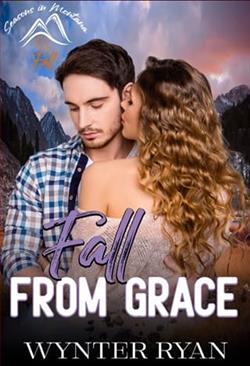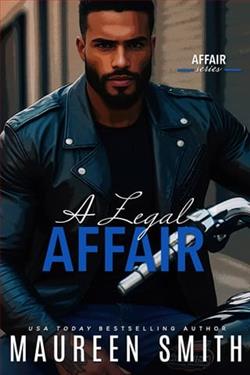Page 66 of This Calder Range (Calder Saga 1)
“Who does?” Benteen murmured, and started his horse forward.
The brindle steer was not given to spooking, making a steady and reliable leader for the herd. When Benteen saw the steer, it was testing the air, not liking what was out there any more than Benteen did. He tried to soothe the rest of the herd with “The Texas Lullaby,” a tune made up of, not words, but wavering notes. Another steer stood up, motionless and expectant. Then it was by twos and threes they were getting up, until the whole herd was on its feet.
The sky became black as hell, split with bolts of fire. The air was so thick it seemed suffocating. Suddenly a glowing light appeared on the top of every horn. It was an eerie sight that Benteen had seen once before in his life—this phosphorescent light folklore called by many names. He knew it as St. Elmo’s fire.
In moments of blackness, there was nothing to be seen but the strange, awesome illumination of more than four thousand horns. Spanish was singing louder from his side of the herd, trying to reassure the beasts that the ghostly lights were nothing to fear. There was a stirring in their numbers as the herd began to mill uneasily.
A great blue ball of lightning ripped from the sky, momentarily blinding Benteen. There wasn’t even time for a breath before the ground shook with a mighty clap of thunder. But the reverberations that followed were made by the stampeding herd, at a mad run in one leap.
The grulla nearly jumped out from under Benteen as it bounded in pursuit of the cattle. The sky burst open, dumping buckets of rain and whipping it in sheets. There was no way of knowing where Spanish and Dollarhide were. Benteen couldn’t see where he was going and had no choice but to trust his horse and stay with the panicked mob of cattle.
Half-blinded by the darkness and the driving rain, he could catch only glimpses of the herd. The eerie glow seemed to dance from horn tip to horn tip, while the heat from their maddened crush of bodies burned the side of his face. There was no time to think of the danger, of a misstep by the horse; it was spur and ride hell for leather to get to
the leaders. One man could turn a herd if he knew how.
Drumming hooves popped and clicked; horn tips clacked together; and the thunder of the storm raged louder than all of it. The little mouse-gray grulla was stretched out until its belly seemed to scrape the prairie grass. They were racing with the leaders of the stampede, running stride for stride. The mustang under him knew its business and pressed into the leaders to force the turn.
Once they had started, the rest of the herd followed. Other riders were skylighted, racing with the herd. What began as a wide circle tightened concentrically into a smaller one until they had coiled into a bawling mill.
The thunder and lightning rolled on across the prairie, but the rain stayed, pouring down steadily. There was no way of telling how much of the herd had scattered in the mad dash, not until morning. The drovers’ job became one of containment to hold the main section of the herd intact.
The Longhorns had run eight wild long miles from camp. Three cowboys were missing—Spanish, Dollarhide, and Woolie Willis. Any number of things could have separated them from the herd—a horse falling or a rider taking out after another bunch. Nobody speculated on the fate of the missing three.
The rain stopped before dawn, the clouds peeling away to show the stars. Before first light, Rusty was hitching the team to the chuck wagon and lending a hand to Mary and Lorna with their wagons. When the soft color of morning was tinting the land, they set out in search of the stampeded herd.
The Longhorns had left a wide trail of trampled grass and churned earth. Along the route, Lorna saw several of the drovers—looking for stray cattle, she presumed. A couple of them stopped, had a word with Rusty, and rode on.
Jessie and Ely were holding the main body of the herd when they arrived. Rusty picked the most likely spot to set up a camp and pulled in the team. Unhitching the horses from the wagon, he left their harnesses on and tied them up.
“You ladies want to give me a hand?” he called to Lorna and Mary. “Those boys is wet and tired. They’ll be wantin’ coffee and some hot grub as soon as they can get it.”
“I’ll get a fire going,” Lorna volunteered, and hopped down from the wagon seat.
“There’s some dry wood and chips in the cooney,” Rusty told her.
The coffee was boiling good when the first riders approached the new camp. Lorna could see the steam rising from the horses’ wet hides. One of the riders spurred his horse to reach camp before the others. Vince Garvey swung out of the saddle, staggering a bit with tiredness.
“They’re bringin’ Woolie in. Broke his leg,” he informed Rusty, and dragged himself to the fire to pour a cup.
Lorna caught the flicker of relief in Rusty’s face, but he growled cantankerously, “And just what am I supposed to be usin’ for splints in this treeless hell?” He quickly bobbed his head at Mary and Lorna. “Beggin’ your pardon.”
“That’s your problem, sawbones.” Vince drank down his coffee. “Bust up the wagon, I guess.” His horse was still standing where the cowboy had dropped the reins, its head hanging low. “Sure hope Yates gets his remuda rounded up,” Vince remarked. “These horses are about to drop.”
“What about Spanish and Dollarhide?” Rusty asked.
There was a long pause while Vince poured another shot of the black coffee into his cup. “They won’t be needing your help.”
For an instant, it didn’t sink in. Lorna hadn’t been aware the two riders were missing, so the significance of Vince’s reply initially missed her, until she saw the long faces of the men riding in.
“They’re dead.” She had to say it aloud, even then she didn’t believe it. “What happened?”
Vince glanced at her, then looked at Rusty and shrugged a nonanswer. The riders entered camp and dismounted, all except one. The injured cowboy was hunched over the saddle, his face sickly pale. Benteen was among the trailhands that carefully lifted Woolie to the ground. His hat tumbled off, revealing the thick mass of curling blond hair that had given him his nickname. He groaned in pain when Rusty probed the length of his left leg.
“This ought to rate me some of your snakebite remedy, Rusty.” Woolie grunted the words in his effort to keep in the pain. The cook was the guardian of the sole bottle of alcohol brought on the drive—for snakebite purposes.
“You got a broke leg, not a snakebite,” Rusty grumped. “But I reckon a couple of swallows might help ’fore I set this leg.”
When he went to the chuck box to fetch it, he motioned Mary and Lorna to come over. Lorna was still numbed by the news of young Joe Dollarhide’s death, and the Mexican-Indian Spanish Bill.















